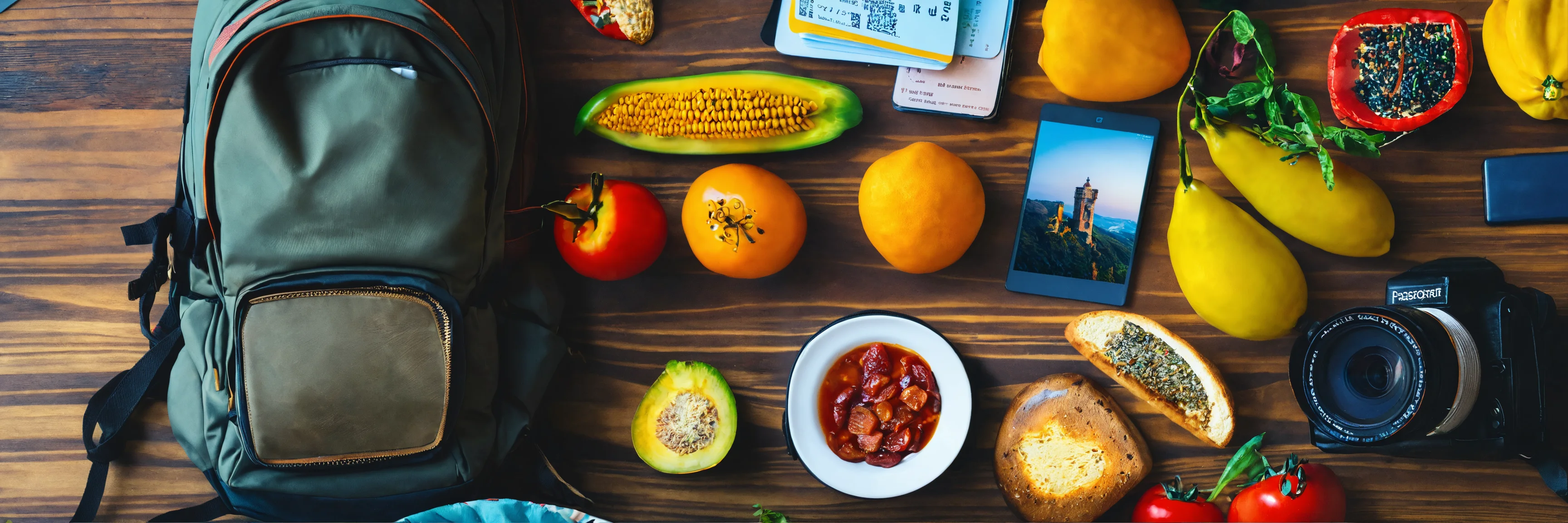Unfortunately, it’s almost impossible to give universal advice regarding dieting. To offer somewhat workable advice, I need to know some information about the person.
But here are some general tips on how to behave while traveling, assuming you know which foods help you lose weight and which ones cause weight gain.
While traveling (and especially during regular life, but especially during travels), the most important thing is:
- Don’t starve
This point seems simple, but people often either neglect it or do the opposite, thinking that the more they starve, the healthier it will be for weight loss and health. They believe that by starving and walking a lot, they will lose a kilogram overnight.
Well, maybe, but that kilogram will disappear due to water loss and, most importantly, muscle tissue loss, which slows down metabolism. Starving today might make a kilogram disappear tomorrow, but it will likely come back the day after, bringing a friend. I’ll talk more about this in the third point.
You shouldn’t starve while traveling, also because it significantly increases the risk of indulging in not only foods that are not helpful for weight loss but also harmful ones, like fast food. When people are hungry, the part of the brain that monitors quality can shut down, leading them to eat anything.
That’s why I recommend always having a snack in your bag while traveling, made of foods that are good for weight loss or maintenance, specifically for you. However, these snacks shouldn’t be sweet. For vegetarians and those who lose weight better on vegetables and grains, it could be dry crispbread, unsweetened crackers, cucumber slices, green pepper slices, a bag of spinach (it’s fun to munch on the go, juicy and tasty), carrots, a few nuts, olives. If you prefer protein, then unsweetened, juicy green vegetables, a few nuts, low-fat cheese, pieces of cooked chicken will suit you.
In addition to sweet snacks (including not only candies and cookies but also fruits, berries, yogurts with added sugar, and all products with artificial sweeteners), I also don’t recommend snacking on fatty cheese, large portions of nuts, bread and bakery products, instant porridge, sweet coffee, and cocoa.
When I go somewhere, if there’s an opportunity, I take pre-cut and foil-packed chicken pieces, sliced cucumber, a little cheese, a few nuts with me. I can take a container with large slices of tomatoes or boiled eggs. It’s one thing if it’s a flight. But I make sure that every day on the trip, I always have a bag of nuts or something like this in my bag. It’s a lifesaver for me personally: Turkey bars. I’ve tried different bars from this series, the lamb ones are not bad, there are options with pepper, but I like turkey the most. I always keep a bar in my bag, and if I get hungry and can’t find decent food nearby, I eat this bar. One package is enough for two weeks of travel (considering that I can eat one or two in the plane because snacks on flights are usually sandwiches or muffins).
So, don’t starve, and to avoid it, always have food with you that won’t make you gain weight but will satisfy your hunger at least for some time.
And one more thing – don’t wait for the next meal through hunger. Never. I believe that long hungry hours are the most dangerous thing not only for weight loss and maintenance but also for health, even for those who don’t need to lose weight.
- Eat enough protein and healthy food
This is the second most important point. While traveling, it’s not always possible to eat only what helps you lose (or maintain) weight. There’s always not only a conscious desire to try local cuisine but also many temptations that often go unnoticed by consciousness.
Yes, exploring is part of the traveler’s experience: trying new places, including on the palate.
But if your goal is to continue losing (or not gain) weight, structure your diet roughly like this: for three days, consciously refuse any temptations, strictly sticking to the maximum within your proven eating routine where you don’t gain or lose weight. On the fourth day at lunch, allow yourself something you’ve been eyeing for the past three days.
Why not breakfast or dinner? For breakfast – because you shouldn’t overload it with carbohydrates. Despite the saying that you should eat carbs for breakfast, it doesn’t mean breakfast should consist of cakes and candies. It means that out of all the carbs you eat during the day, most should be eaten in the first half of the day (roughly until 3 p.m.), because by the evening, not only does your metabolism slow down, preparing you for sleep, but also these carbs simply have nowhere to go, unless you plan to do intense cardio in the evening (even a long walk as intense cardio won’t cut it).
Why you shouldn’t eat sweets for breakfast, even fruits. Simply because during sleep, metabolism slows down, the body gets slightly hungry, and on an empty stomach, sugars (especially fructose!) very quickly rush into fat stores, as they find it very cozy there. So have slow carbs and proteins for breakfast, giving preference to what you lose weight better on.
So, on the fourth day, you’ll have a festive exploratory lunch, ideally sticking within limits rather than trying to taste every piece of pie if you happen to find yourself in a bakery. If you lose control, you’ll regret it later because after three days of decent behavior, going all out on the fourth day will make you feel heavy for the rest of the day, and you won’t be able to walk around and explore new places properly.
But for curiosity’s sake, you can indulge to understand how tough it can be. 🙂
In general, I don’t recommend trying a little bit of everything every day (ice cream today, pastry tomorrow, half a liter of sangria the day after). If you absolutely can’t be a saint for three days, hold on as long as you can – a day, two, and then treat yourself to a meal.
In India (in India!), it was only towards the end of the second week that I tried sesame sweets and cookies, and only because I got sick and started taking antibiotics: they significantly increase appetite. The only thing I tried was the wonderful oily naan. Otherwise, my diet consisted of garlic chicken and raw cucumbers and tomatoes.
- Don’t neglect strength training
There’s a misconception that the more we walk during trips, the better. It might be good for health but not for weight loss. In the short term, cardio might help. But in the long term, it doesn’t. Especially low-intensity, long-lasting, monotonous cardio, like walking.
Firstly, if you haven’t exercised for a while, it will certainly help at first. But then the effectiveness will decrease. There are various reasons for this, and many articles have been written on this topic, but the main thing to know is a) adaptation and b) muscle burning. Yes, cardio, especially prolonged cardio, especially if you allow yourself to be hungry and don’t supply yourself with enough amino acids, burns muscles. But, the worst part is, not only muscles, but also organ tissue, if you dedicate a lot of time to low-intensity cardio and don’t eat enough protein. Of course, this is extreme, but if your body quietly nibbles at muscles, it already slows down your metabolism, and if you also don’t eat enough (and rarely), then your body thinks, “That’s it, tough times are here, time to store fat.” And it will gladly store every bit of fat you consume when you come home after long walks, happy that you burned so much today during your hikes. Moreover, fat and sweets will be stored first.
That’s why it’s so important to always have “healthy” snacks with you and mostly stick to your healthy diet. That’s why I don’t recommend having “food holidays” every evening or every day.
I know that it’s hardest to do strength exercises while traveling, especially if you suddenly (for your body) started walking a lot. It would be great to do some strength exercises every other day at least. You don’t need to exercise for an hour, you don’t need special gyms and equipment. There are several simple exercises that you can do in any setting if you can spare yourself at least 20 minutes. These include squats, push-ups, lunges, crunches, and planks. Throw a set of fitness bands in your bag (I have one, and here are examples of exercises with them), they weigh almost nothing. But you can do a lot of exercises with them, including for chest and back, they add resistance to leg and thigh exercises. It’s a pleasure.
If there’s a little space left in your suitcase, a great “always with you” trainer is suspension straps. I have those too. They also weigh almost nothing, and you can attach them to any door. And they can easily kick your butt.
Strength exercises while traveling not only help you keep your muscles toned and not lose strength, but also compensate for the loss of muscle tissue during long walks around the area. Well, if you don’t need to walk a lot while traveling, then strength exercises every three days will always give you a great endorphin boost and the realization of how cool you are in the process of losing (or maintaining) weight: you exercise even while traveling.
- Limit alcohol and drink enough clean water
Well, it’s all clear here. Alcohol slows down metabolism, hinders you from being in good shape and moving a lot (if necessary). Well, and water is clear too. I always have a collapsible water bottle in my bag when traveling (here, for example). You can always fill it with water from a fountain at the airport and don’t have to buy it.
Also, very often during trips, we mistake thirst for hunger and eat when we should drink. So, some “hunger” episodes can be satisfied with a glass of water. If you’re still hungry after 10 minutes, then it might actually be hunger. And then you can have a snack or eat a full meal.
That’s roughly it.
If you take something from this on board, that would be great.





No responses yet